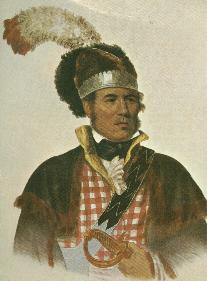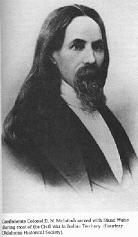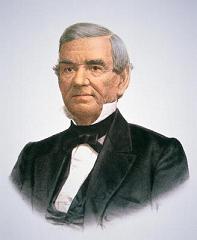

| Home Contents Contact |
|
|
The foregoing article is reproduced from The Daily Record and Mail, of Tuesday, 6th September 1904. It was written by ‘Major’ John M. Burke, press agent with Buffalo Bill’s Wild West and Congress of Rough Riders of the World, which had been in Glasgow a few weeks previously. This is one of Burke’s famous press releases, intended to highlight perceived common ground between the members of the entourage and the host culture.John M. Burke’s opinions and interpretation of the history of the ‘Five Civilized Tribes’ and of the manner in which Native Americans have benefitted from so-called material progress are reproduced here verbatim, and - almost - without comment:
Men of the North in the Far West

Chief William McIntosh, Creek Nation The distribution of man over the face of the earth forms as interesting a subject as his origin, with which the scientists of the day are called upon to deal. Ages have passed and nations have thriven and decayed, but many of them have left indelible traces of their existence upon the surface of the globe, and from these can be traced the fascinating story of other ages and other peoples. None is more attractive than to trace the adventurous wanderers from the old countries and analyse the results of their assimilating with other peoples. During the years I have been associated with Buffalo Bill’s Wild West I have met many different races and nations, and have acquired much information on this subject, very interesting to Scotsmen.
In the U.S. there are Indians in various degrees of civilisation. The Sioux who are now with Col. Cody are the last of what are called the Blanket Indian, and are but lately off the war-path.
There are among the Indian tribes what are called the “civilised nations” - originally the Choctaws, Cherokees, Shawnees, Creeks, and Seminoles - who were removed from the Far Eastern sections of the South, the mountains of Georgia, South and North Carolina, a region very similar to the Scottish Highlands. As such it attracted some of the early Scotch adventurers and ex-soldiers of the English Army (Scotch Highlanders).
It was well gamed in old times, the climate was beautiful, rice and other products were plentiful, and the situation was one that appealed to the clansmen of the North.
Rich Natives
These “nations” or tribes, together with the Pawnees, Osages, Kiowas, form what is known as the Indian Territory, and will soon probably be admitted as an independent State. They are the richest in property of any people in the world, are very far advanced in civilisation, and have large sums of money in the U.S. Treasury from which they get yearly incomes, the Osages averaging yearly £80 for every man, woman and child in the family, besides landed estates now allotted and a communal interest in the reservation, its agricultural and mineral wealth. Their advancement is largely attributed to the injection of Scotch blood over a century ago. In fact, like Perfiromo Diaez, the Grand President of Mexico, who is seven-eighths Indian and one-eighth Castilian Spanish, these people are liable to produce leaders and statesmen that old Scotland will be proud of.
The prevalence of Scotch names with the Creek and Cherokee Indians has at various times been the source of some comment. Although other “nations” or tribes, and in fact, nearly every “nation,” is represented by the names borne by these people, these Scotch names are more numerous and have suffered less change than those acquired from any other nation. The names of some of these Scotch Indians are closely allied with the history of these two nations for the past 100 years, and for several generations such names as McIntosh, McKellop, McCombe, Adir (sic - this should be ‘Adair’), McQueen and McGillivray are registered on nearly all the treaties and official papers of moment in either nation. Men bearing those names today are among the foremost of the progressive Indians.

Daniel Newnan McIntosh, Creek Nation
Some Noted Indians

John Ross, Principal Chief of the Cherokee Nation, 1828-1866 Among the Indians of Scotch descent celebrated in our country was General Parker, who was on General Grant’s staff and in Grant’s administration, was a Cabinet Minister, holding the portfolio of the War Department. Among the killed on General (sic) Reno’s side in the Custer fight was Lieut. Donald McIntosh, a graduate of the West Point Military Academy, and of Scotch and Indian descent. He was the first Indian graduate, standing high in his classes and a young officer of great bravery. Mr Curtis, the present chairman of the Indian Committee in the House of Congress, is of Scotch and Indian descent. The Ross family have long been hereditary chiefs in the Cherokee Indian Nation, Donald Ross being a familiar family name. The Gordons and Porters figure among the Choctaws and Creeks. The principal town in Indian territory is named McAllister.
The territory of Oklahoma, which was opened up a few years ago, contains 625,000 inhabitants. This territory was sold to the Government by the Indians, and the singular thing to Scotsmen will be that the site of the Central village was called Guthrie, and to-day the well-built Guthrie City is the capital of Oklahoma, while McAllister is the principal town in Indian territory.
The McKenzies, the McGregors, and the McKays all figure extensively in the development of the United States and Canada, the latter being associated with the elder John Jacob Astor in the development of the fur trade of the North West, identified with the history and romance of Astoria (Washington Irving) and with the adventures of early frontier life, exploration and development. Donald Mackay, the Indian scout, was a descendent of the McKays of Boston, who were shipbuilders, and sent the first ship for Mr Astor round to Astoria where Vancouver is now, and married into the Indian tribes. Donald Mackay was a scout, the same character as Buffalo Bill, and will live in history as the capturer of “Captain Jack”. The Mackays were fine specimens of the mixtures of the two races - six feet two inches, splendid physique, regular features, and, if anything, darker than the average Indian.
Back a Hundred Years Of course, outside of this present connection that I am speaking of, the Scotch in America have carved their names in every line of commerce, art, science, and literature high on the scroll of American history.
Among the Indians the origin of Scotch names dates back over 100 years. I quote from the Indian Territory “Okmulgee News”.
“At that time the Creek and Cherokee Indians more especially bent their efforts toward building up a nation of physically perfect men. The women were encouraged only to mate with the strong robust men of the tribe, and if a weak man withstood the taunts and jibes of his fellows and remained, there was little chance of his securing a wife. In that way the life of these people was almost Spartan.“While this sentiment was at its height, and the tribes were living in Georgia, sometime before the Revolution, a regiment of Scotch Highlanders was quartered in the vicinity of one of the principal villages of the nations. The Indian maidens looked with favour upon the burly man of the North of Scotland, and a number of marriages was the result. When the regiment was ordered back to England or some other quarter of the Globe, some of these Scotsmen, when their time of enlisting had expired, stayed behind, and their names have yet been fixed in the annals of the Creek Nation.”
It is through the Creeks that the Cherokees acquired their Scotch names. Descendants of these Highlanders have been enrolled in the armies of the United States since that time, and President Roosevelt had several of them in his “Rough Riders.”


